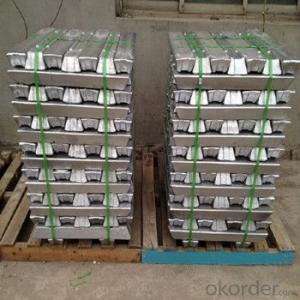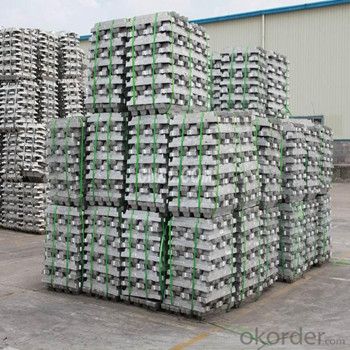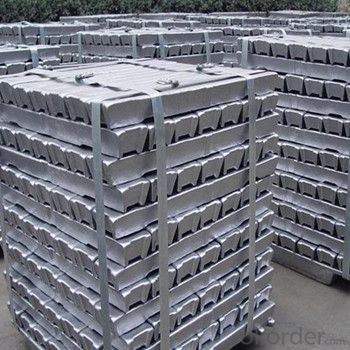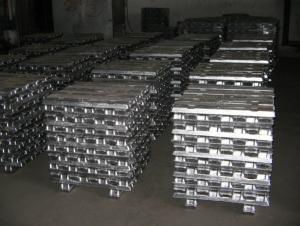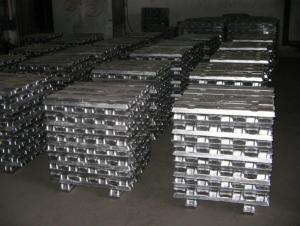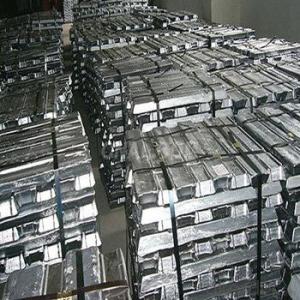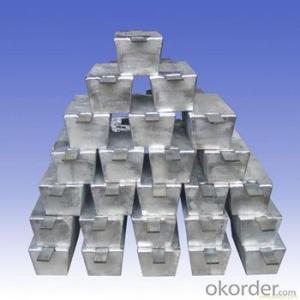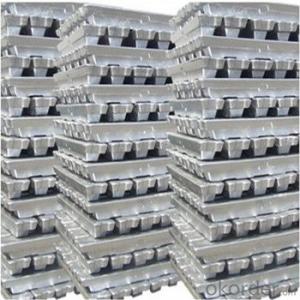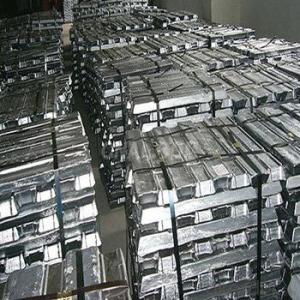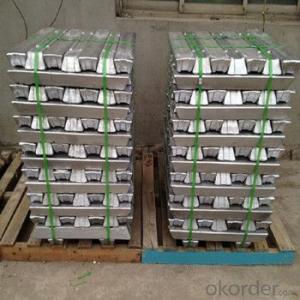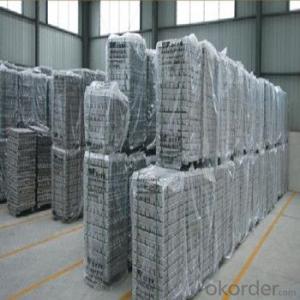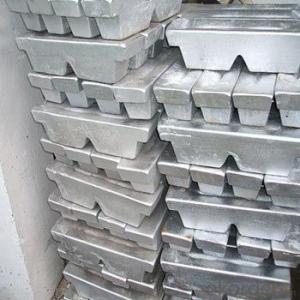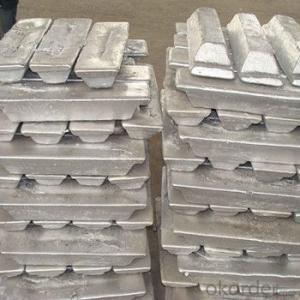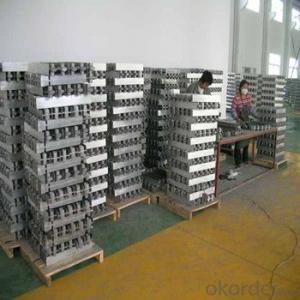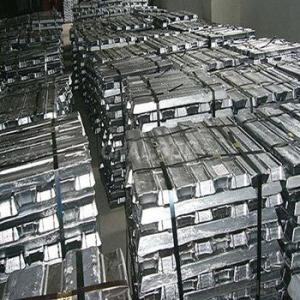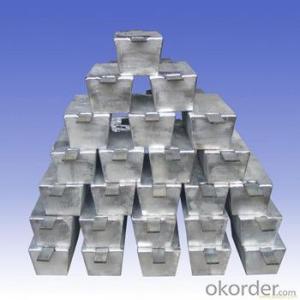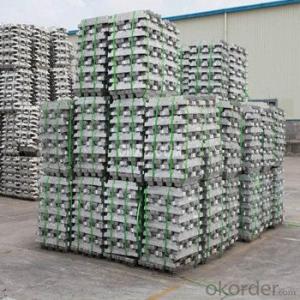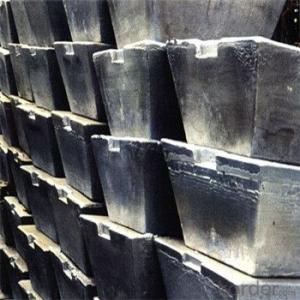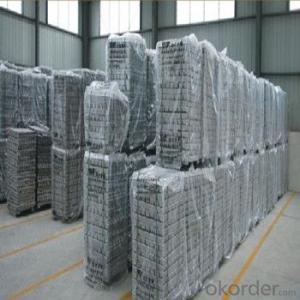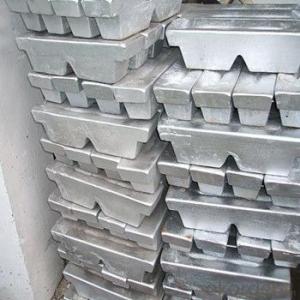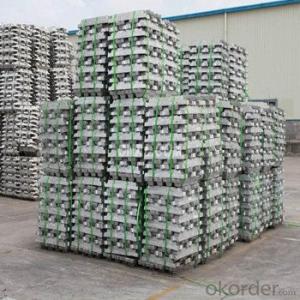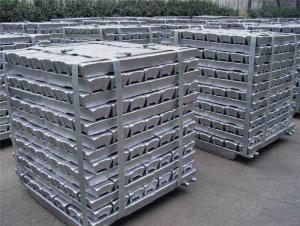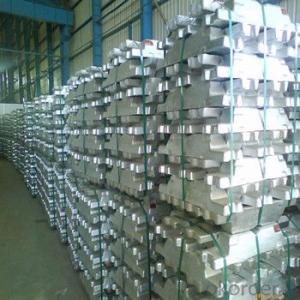Aluminium Ingot 99.9% High Quality With The Lowest Price
- Loading Port:
- China main port
- Payment Terms:
- TT OR LC
- Min Order Qty:
- 10000 m.t.
- Supply Capability:
- 100000 m.t./month
OKorder Service Pledge
OKorder Financial Service
You Might Also Like
Pure Aluminum Ingot Used for Industry
1.Structure of Aluminum Ingot Description
A material that has been cast into a shape in order to be transported and processed easier than in an unprocessed form. An ingot is typically rectangular in shape, which allows it to be stacked. Ingots are most commonly associated with metals, with ingots of gold held in the vaults of banks and brokerages being popular images.
2.Main Features of the Aluminum Ingot
•High Purity
•High strength
•Fast melting
•Best price
•Good after-service
3. Aluminum Ingot Images
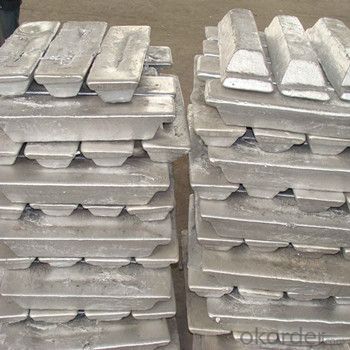
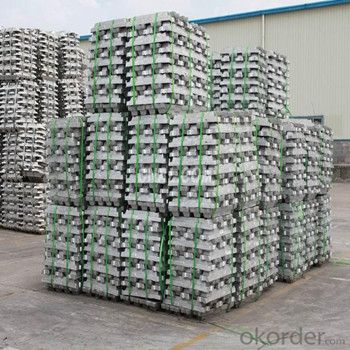
4. Aluminum Ingot Specification
| 500*500*6mm | 500*500*8mm | 1000*500*20mm | 1000*500*15mm |
| 1000*500*8mm | 1000*500*10mm | 1000*500*30mm | 1000*500*6mm |
| 1800*800*20mm | 1800*800*10mm | 2000*1000*20mm | 2000*1000*10mm |
5.FAQ of Aluminum Ingot
We have organized several common questions for our clients,may help you sincerely:
①How about your company?
A world class manufacturer & supplier of castings forging in carbon steel and alloy steel,is one of the large-scale professional investment casting production bases in China,consisting of both casting foundry forging and machining factory. Annually more than 8000 tons Precision casting and forging parts are exported to markets in Europe,America and Japan. OEM casting and forging service available according to customer’s requirements.
②How to guarantee the quality of the products?
We have established the international advanced quality management system,every link from raw material to final product we have strict quality test;We resolutely put an end to unqualified products flowing into the market. At the same time, we will provide necessary follow-up service assurance.
③How long can we receive the product after purchase?
In the purchase of product within three working days, We will arrange the factory delivery as soon as possible. The pecific time of receiving is related to the state and position of customers.Commonly 7 to 10 working days can be served.
- Q: Are aluminum alloy ADC12 and aluminium ingot ADC12 the same?What's the difference? The price you see in Ali looks different
- Friends, you ask what is the same thing, the price is certainly not the same, the aluminum ingot price is floating
- Q: Aluminum is pure aluminum expensive, or aluminum alloy expensive, aluminum ingot expensive, aluminum just expensive
- Processing flow of aluminum alloy1: aluminum ingot (the kind of box)2: aluminum rod (aluminum ingot produced by melting)
- Q: The mold is aluminum magnesium ingot foundry made it
- Now, most of them are made of resin bonded sand.
- Q: Could you tell me how to calculate the value of aluminum material? By weight or by length or by other means?
- By weight, but we should note that the market is now sub national standards, non-standard more than two kinds of weight profiles sold.
- Q: How are aluminum ingots used in the production of electrical connectors?
- Aluminum ingots are commonly used in the production of electrical connectors due to their excellent conductivity and lightweight properties. The ingots are initially melted and cast into specific shapes, such as bars or rods, which are then further processed to form the connectors. One of the key advantages of using aluminum ingots is their high electrical conductivity. Aluminum is an excellent conductor of electricity, allowing for efficient transmission of electrical signals in various applications. This makes it an ideal material for producing connectors that need to facilitate the flow of electricity without significant resistance or loss. Moreover, aluminum ingots offer lightweight characteristics compared to other materials, such as copper. This lightweight property is particularly advantageous for electrical connectors, as it allows for easier installation, handling, and transportation. The reduced weight also helps to minimize strain on electrical systems and devices. To produce electrical connectors, the aluminum ingots are typically first melted and cast into specific shapes using casting techniques. These shapes can include bars, rods, or even intricate designs depending on the connector requirements. The ingots are then further processed through machining, extrusion, or other shaping methods to achieve the desired dimensions and features. Once the aluminum connectors are shaped, they undergo additional processes such as surface treatment or coating to enhance their performance and durability. This can include plating with materials like silver or tin to improve conductivity or applying protective coatings to prevent corrosion. Overall, aluminum ingots play a crucial role in the production of electrical connectors, providing a reliable and efficient material that meets the demands of modern electrical systems. Their excellent conductivity, lightweight nature, and versatility make them an ideal choice for a wide range of electrical connector applications.
- Q: What elements do alloy die casting ingots require?
- Copper and aluminum composition of solid solution, when the temperature is at 548 DEG C, the solubility of copper in aluminum should be 5.65%, room temperature dropped to about 0.1%, the increase of copper content, fluidity of the alloy can be increased, the tensile strength and hardness, corrosion resistance and reduce the plasticity, the cracking tendency increases.
- Q: Aluminum sold alone, high benefit ah, why do aluminum ingot?
- Aluminium ingot > melting > high pressure air or nitrogen atomizing > atomizing aluminium powder > classification put into ball mill (dry or wet) > ball milling aluminium powder (aerated, coating, fuming, pesticide, aluminium powder, etc.)
- Q: What are the different surface treatments for aluminum ingots?
- Some common surface treatments for aluminum ingots include anodizing, powder coating, painting, and polishing. Anodizing involves creating a protective oxide layer on the surface of the ingot, while powder coating and painting provide a decorative and protective coating. Polishing is done to enhance the appearance and smoothness of the aluminum surface.
- Q: How is the purity of an aluminum ingot determined?
- The purity of an aluminum ingot is typically determined through various analytical techniques. One of the most common methods involves using a spectrometer to measure the elemental composition of the ingot. This technique is known as optical emission spectroscopy (OES) or spark testing. In OES, a small sample from the aluminum ingot is vaporized using an electric spark, and the resulting emission of light is analyzed. Each element emits a unique spectrum of light, and by comparing the intensities of these spectral lines to known standards, the concentration of different elements in the ingot can be determined. This allows for the identification and quantification of impurities such as iron, copper, silicon, and other trace elements. Another method to assess purity is through chemical analysis. This involves dissolving a sample of the ingot in a suitable acid or solvent and performing various chemical reactions to quantify the impurities. For example, a common technique called atomic absorption spectroscopy (AAS) can be used to measure the concentration of specific elements in the solution. Besides these analytical techniques, other non-destructive tests like ultrasound or X-ray analysis can also be employed to assess the integrity and purity of the aluminum ingot. These methods can detect any internal flaws or inclusions that may affect the quality of the ingot. Overall, a combination of these analytical techniques is used to determine the purity of an aluminum ingot, ensuring that it meets the required specifications for various industrial applications.
- Q: Can aluminum ingots be used in the production of jewelry?
- Yes, aluminum ingots can be used in the production of jewelry. However, aluminum is not a commonly used material for jewelry due to its low melting point and softness. It is often used in costume jewelry or as a base metal for plating.
Send your message to us
Aluminium Ingot 99.9% High Quality With The Lowest Price
- Loading Port:
- China main port
- Payment Terms:
- TT OR LC
- Min Order Qty:
- 10000 m.t.
- Supply Capability:
- 100000 m.t./month
OKorder Service Pledge
OKorder Financial Service
Similar products
Hot products
Hot Searches
